Water is a precious resource that we can’t live without; from supplying drinking water and supporting fisheries, to providing an essential resource to business and agriculture, as well as a source of recreation.
It is important that our rivers, lakes, estuaries, coastal areas, wetlands and groundwater are managed properly to ensure the needs of society, the economy and wildlife can be met and maintained over the long-term.
As a result of climate change we are experiencing longer hotter summers and more intense rainfall in winters, leading to an increased likelihood of drought and flooding events.
The Environment Agency has a crucial role as a regulator, in responding to periods of prolonged dry weather and drought. We monitor conditions, protect sensitive habitats, and work with Water Companies and other abstractors to safeguard supplies.
We work with water abstractors to balance the needs of the public, industry and farmers, and the environment, to ensure long-term water resilience.
All sectors should continue to plan and invest for all weather eventualities and future droughts, especially with the ongoing challenge of securing England’s water supply in the face of a growing population, urbanisation and climate change.
We have pulled together some information and links which may be useful to you.
If you have any questions or queries you can call our National Customer Contact Centre for advice on 03708 506 506.
The Environment Agency are carrying out farm visits and will be looking at private water supplies and regulation of taking water from the environment.
If you have a private water supply, how much water are you taking? Do you need a licence?
More information can be found here: https://www.gov.uk/guidance/check-if-you-need-a-licence-to-abstract-water
The Environment Agency is working with the sector to produce Water Resources Management Plans for agriculture to help it achieve improved resilience of supplies.
Water abstraction during prolonged dry weather and drought
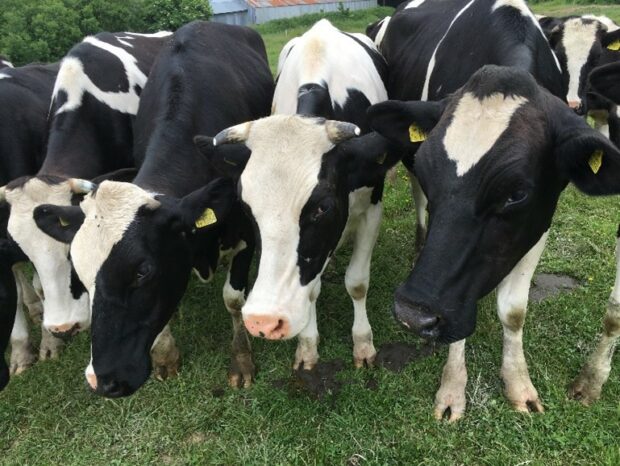
Water abstraction is the process of taking water from a natural source, such as a river, lake, stream, spring, groundwater well, borehole, or the sea, for any purpose, such as irrigation, industry, recreation, flood control, or treatment to produce drinking water.
Here is some guidance for non-water company abstraction licence holders affected by prolonged dry weather and drought: https://www.gov.uk/guidance/water-abstraction-flexible-options-in-exceptional-dry-weather
The information on the link above includes:
- Water situation reports: monthly local reports on rainfall, soil moisture deficit, river flows, groundwater levels and reservoir levels
https://www.gov.uk/government/publications/water-situation-local-area-reports - Farming Advice Service: the ability to irrigate and lift crops
https://www.farmingadviceservice.org.uk/technical-articles - Agriculture and Horticulture Development Board (AHDB): water supply problems? A guide for livestock farms
https://ahdb.org.uk/water-supply-problems-a-guide-for-livestock-farms - UK Irrigation Association information
https://www.ukia.org/resources-booklets/
The National Farmers Union (NFU) have a Dry weather information and advice page:
Water abstraction
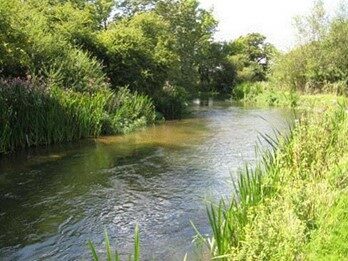
Those with abstraction licences are only consented to take water in the pre-agreed terms and conditions.
Abstractions of 20,000 litres (20 cubic metres) per day or less are exempt, provided the abstraction is part of a single operation – if you abstract from the same source at multiple points, the exemption only applies if the combined total of all abstractions is 20 cubic metres or less a day. Any abstraction of water greater than 20 cubic metres from the environment is likely to require a licence.
List of exempt activities which do not require an abstraction licence: https://www.gov.uk/guidance/check-if-you-need-a-licence-to-abstract-water#when-you-do-not-need-a-licence
If there is no abstraction licence, it may be possible to enter into an agreement with an existing licence holder. It can be agreed for a licence holder to give you part or all their abstraction right, permanently or temporarily. This is called the trading of water rights.
More information can be found here:
No ‘temporary’ weirs can be constructed to impound water and boost abstraction during low flow periods.
Repairing weirs without consent is either a breach in Environmental Permitting Regulations (EPR) or land drainage consent depending if it’s on a main river or not.
More information can be found here:
Owning a watercourse: https://www.gov.uk/guidance/owning-a-watercourse
Managing your abstraction licence online
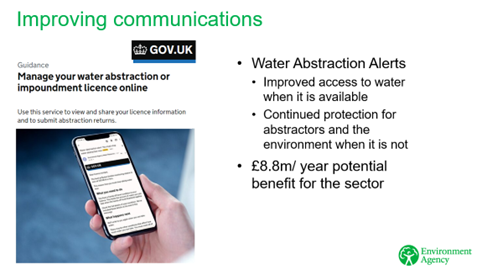
You can now use the Manage your Water Abstraction Service on GOV.UK to submit your water abstraction returns online, view a summary of your licence and past returns, and give someone else access to manage your account.
Signing up also allows applicable abstractors to receive Water Abstraction e-Alerts from the service, which are email notifications sent by the Environment Agency when flows are low and licence conditions mean that abstraction needs to reduce or cease. The e-Alerts also let abstractors know that flows have recovered so they can take water again. The alerts improve access to water when it is available, and better protect the environment and other abstractors when it is not.
Details about how to sign up to manage your water abstraction or impoundment licence online can be found here: www.gov.uk/manage-water-abstraction.
If you have any questions, please email WRModernisingRegulation@environment-agency.gov.uk.
More information about e-Alerts can be found here: https://defradigital.blog.gov.uk/2022/08/23/preservation-compliance-and-registration-three-keys-to-managing-our-precious-water-resources/
Spray irrigation
Sprinkler/spray irrigation is the method of applying water to a controlled manner in that it is similar to rainfall. The water is distributed through a network that may include pumps, valves, pipes, and sprinklers.
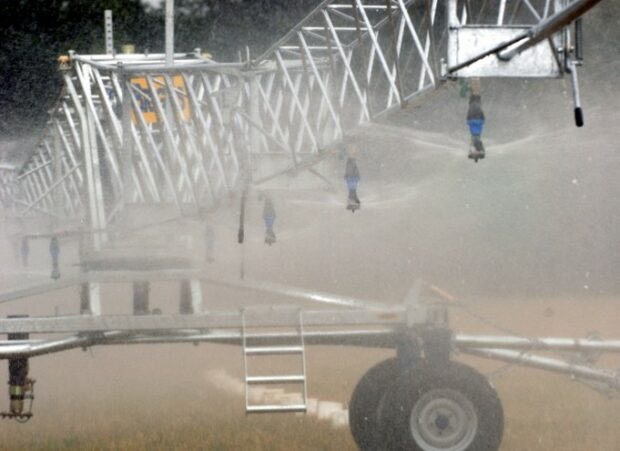
Spray irrigation abstraction licence holders should have a number of actions to ensure the efficient use of water on the farm.
Many of these measures represent best practice and will help to make the most of the water which the licence authorises to take.
- Monitor water consumption, ensure water measurement devices are installed to accurately measure the quantities of water abstracted
- Prevent and deal with leaks
- Maintain equipment, making sure it’s properly set up
- Irrigation scheduling - apply the correct amount of water at the right time
Information on how to manage water use, levels, drainage and irrigation, and avoid pollution from waste water and sheep dip, can be found here: https://www.gov.uk/guidance/manage-water-on-land-guidance-for-land-managers
Environment Agency updated prospects for irrigation - forecast for 2023, can be found here: https://www.farmingadviceservice.org.uk/technical-articles
Farming Rules for Water
Any new water sources would also need to comply with the new farming rules for water regarding livestock and protecting water sources.
Details of the ‘farming rules for water’ can be found here: https://www.gov.uk/government/publications/farming-rules-for-water-in-england
Horticulture, water infrastructure and grants
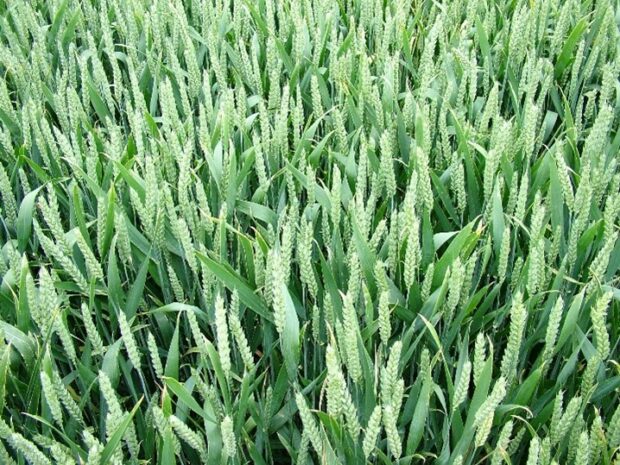
The Department for the Environment, Food & Rural Affairs (Defra) is supporting farmers and growers to boost horticultural production by providing targeted productivity grants, such as those through the Farming Investment Fund and Farming Innovation Programme.
For long-term planning of on-farm water infrastructure, such as water reservoirs and new irrigation systems, the Rural Payments Agency launched the Water Management grant.
More information can be found here:
Farming Equipment and Technology Fund
How to apply for a local water resources options screening study
Reporting incidents
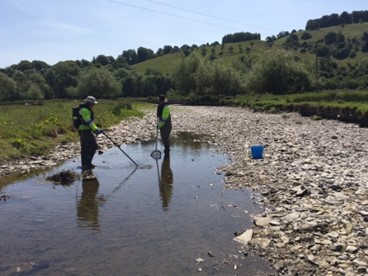
If you are out and about please report incidents to our hotline 0800 80 70 60.
It's free and open 24 hours a day.
Incidents you should report if you see them include:
- fish in distress
- collapsed or badly damaged river banks and beds
- unusual drops in river flow
- people taking water illegally from rivers, streams, canals or underground sources such as wells
More information on other incidents we would like to know about and how to report can be found here: https://www.gov.uk/report-an-environmental-incident
If you have any questions or queries you can call our National Customer Contact Centre for advice on 03708 506 506.

Leave a comment